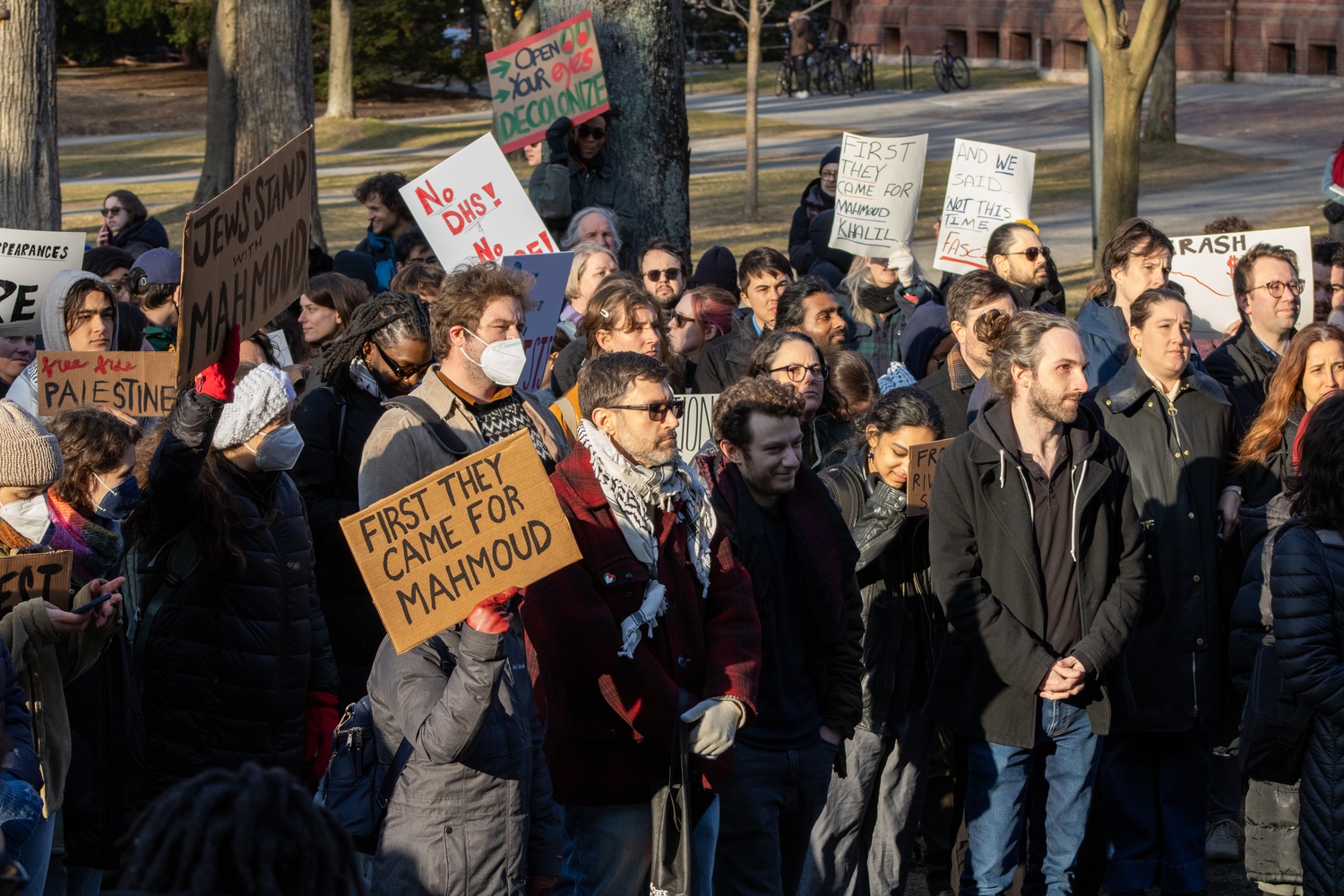
News
Summers Will Not Finish Semester of Teaching as Harvard Investigates Epstein Ties

News
Harvard College Students Report Favoring Divestment from Israel in HUA Survey

News
‘He Should Resign’: Harvard Undergrads Take Hard Line Against Summers Over Epstein Scandal

News
Harvard To Launch New Investigation Into Epstein’s Ties to Summers, Other University Affiliates

News
Harvard Students To Vote on Divestment From Israel in Inaugural HUA Election Survey
We’re Harvard Professors Suing the Trump Administration. Here’s Why.
A Columbia University graduate arrested for pro-Palestinian activism, a Brown University professor denied entry and deported after visiting her family in Lebanon, a Tufts University Ph.D. student snatched on the street on her way to Ramadan iftar by masked federal agents: In the past two weeks, we have watched in horror as scenes familiar from our studies of history have played out on and around U.S. university campuses.
Each of these individuals is or has been a U.S. lawful permanent resident or visa holder, and has been seemingly targeted for political speech that the government doesn’t like. Their persecution forms part of a frontal assault on higher education by the Trump administration designed to quash freedom of inquiry and expression. Never in our lifetimes have universities, one of the foundations of American democratic society, faced such an existential threat.
Harvard faculty recently established a chapter of the American Association of University Professors, a national organization founded in 1915 to advance academic freedom and “to ensure higher education’s contribution to the common good.” On Tuesday, the AAUP-Harvard chapter joined the national AAUP, AAUP-NYU, AAUP-Rutgers, and the Middle East Studies Association in suing the Trump administration to stop its campaign of “ideological deportation” against non-U.S. nationals.
“This is the first arrest of many to come,” crowed President Trump after the abduction of Columbia’s green-card-holding Mahmoud Khalil on March 8, essentially putting non-U.S. citizens on notice. The warning hits hard at Harvard. Roughly 15 percent of College students and over 30 percent of Graduate School of Arts and Sciences students are international; virtually every department has non-citizen faculty and staff members. The administration is wielding its power over individuals’ immigration status to coerce them into silence on political issues. And so far, the tactic seems to be working.
Every day we hear from international students and colleagues who are frightened about what might happen next. Frightened that any expression of political ideas — whether related to Palestine or not — can be used to strip them of their legal residency status. Frightened that their movements, messages, and social media trails are being surveilled. Frightened that by conducting their research abroad or simply visiting their families they will be denied the ability to return to their homes in the United States.
Harvard's International Office posted immigration resources for those traveling over spring break, following heightened anxieties about visa- and green-card holders' freedom of cross-border movement. Some non-citizen faculty have told us they are reluctant to join the AAUP chapter out of fear of retaliation. Across the country, some non-citizen students have gone into hiding.
These arrests don’t simply appear to violate non-citizens’ Constitutional rights. As we argue in our lawsuit, AAUP v. Rubio, they violate the rights of U.S. citizens too. Implicit in the First Amendment is the right not just to speak, but to listen: to hear and be informed by the views of others. We all suffer when our non-citizen students and colleagues are forced to censor themselves and to withdraw from discussion and debate. There can be no free exchange of ideas under these conditions. And without the free exchange of ideas, the university loses its purpose.
For now, the Trump administration has targeted pro-Palestinian campus activists, shored up by allegations of antisemitism and “terrorism.” (Ironically, the administration invoked a 1952 law in Khalil’s case alleging that his presence poses “potentially serious adverse foreign policy consequences” for the country — part of which was ruled unconstitutional in 1996 by President Trump’s own sister.) This is a clever gambit because of how effectively the Israel/Palestine issue divides opinion on and off campus. But whatever anybody thinks about its content, freedom of expression is protected under the First Amendment.
We have every reason to expect that the Trump administration’s plans extend far beyond these individuals, and far beyond the issue of Israel/Palestine. We don’t need to turn back to the well-worn example of Nazi Germany to see how the targeting of specific people or ideas can pave the way for far wider repression. The same playbook is being used by some of the democratically-elected leaders Trump most admires, such as Victor Orban in Hungary and Narendra Modi in India, who have fiercely suppressed dissent and open inquiry on campuses. “They won’t stop there,” says AAUP President Todd Wolfson, “They’ll come next for those who teach the history of slavery or who provide gender-affirming health care or who research climate change or who counsel students about their reproductive choices.”
The repressive techniques being wielded against non-citizen students and scholars threaten everybody invested in the values of freedom of expression and due process at the heart of U.S. constitutional democracy. Universities are currently on the front lines of a battle for basic civil liberties. We must fight for the values — and the people — that define us.
This lawsuit is a start.
Maya R. Jasanoff is the X.D. and Nancy Yang Professor of Arts and Sciences and Coolidge Professor of History and a member of AAUP-Harvard Faculty Chapter. Kirsten A. Weld is a professor of History and is the president of AAUP-Harvard Faculty Chapter.
Want to keep up with breaking news? Subscribe to our email newsletter.

